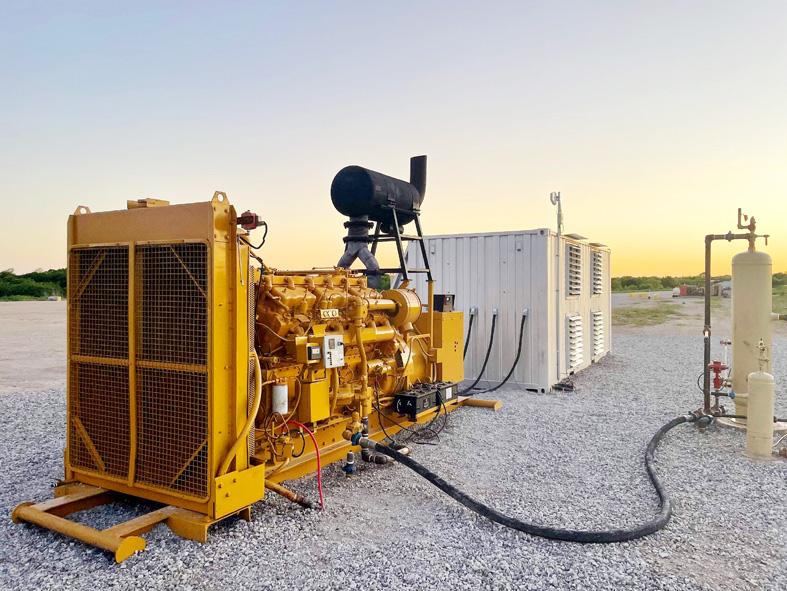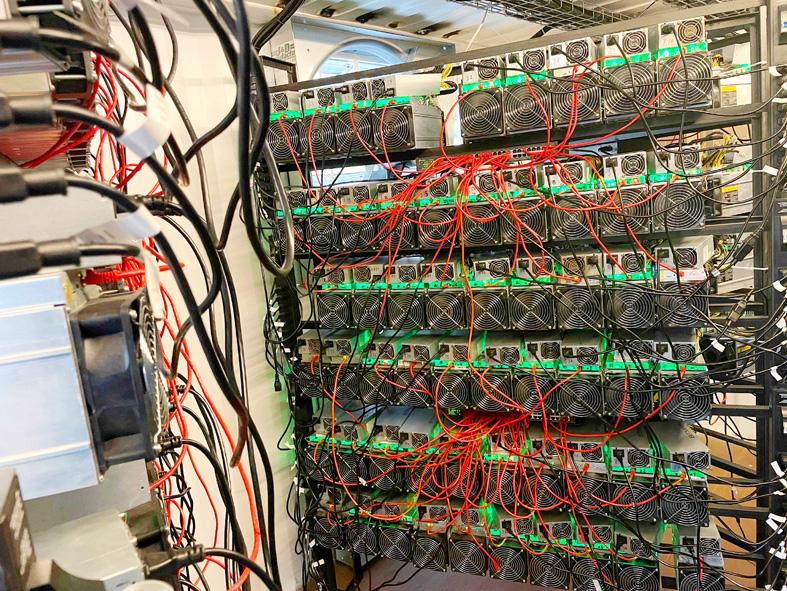As the value of bitcoin soars and concerns rise about the energy-intensive process needed to obtain it, cryptocurrency entrepreneurs in the US believe they have found a solution in flared natural gas.
Profitably creating, or mining, bitcoin and other cryptocurrencies requires masses of computers dedicated to solving deliberately complicated equations — an endeavor that globally consumes more electricity than entire nations, but for which these start-ups say the jets of flaming gas placed next to oil wells are perfect power sources.
“I think the market is enormous,” said Sergii Gerasymovych, CEO of EZ Blockchain, which has six different data centers powered off natural gas in the US states of Utah and New Mexico, as well as in Canada.

Photo: AFP / Matt Lohstroh / handout
Across the country, companies like EZ Blockchain are setting up shipping containers where racks containing hundreds of computers mine cryptocurrency, fueled by natural gas from oil wells that otherwise would be burned in the open.
Interest in their work has grown over the past year. Bitcoin and other cryptocurrencies like ethereum and dogecoin have seen meteoric price spikes since the COVID-19 pandemic turned the global economy on its head and mainstream companies began to embrace the technology.
A backlash has formed against the digital assets’ energy usage, fueled by concerns it relies on carbon-emitting power sources that contribute to climate change.

Photo: AFP / Matt Lohstroh/ handout
This week, Tesla Inc boss Elon Musk criticized bitcoin’s power consumption, particularly of energy produced from coal, and said he would no longer accept the cryptocurrency as payment for his electric vehicles.
While entrepreneurs in the fledgling industry say that using natural gas that is otherwise wasted represents a solution to these concerns, its ability to actually cut emissions remains to be seen, said Tony Scott, managing director of analysis at oil and gas research firm BTU Analytics.
“In the grand scheme of things and relative to other load, yes, it’s small,” Scott said. “They are creating economic value; they’re not necessarily significantly changing the emissions profiles.”
Huge numbers of processors worldwide are dedicated to the task of mining bitcoin. The activity uses 149.6 terawatt-hours per year, according to the Cambridge Bitcoin Energy Consumption Index (CBECI). That is slightly less than all the electricity consumed by Egypt.
As the most popular cryptocurrency, bitcoin is undoubtedly valuable, trading at about US$50,000 in the middle of this month from less than US$10,000 a year earlier, giving miners incentive to find the cheapest source of power to increase their margins.
Enter flared natural gas. Oil producers flare natural gas if they cannot find a way to process it, which, with prices low and pipelines complicated to build, can be the case worldwide.
“Miners tend to be based around areas where there tends to be surplus power. What is new ... is this whole concept of taking gas flaring,” said Jason Deane, bitcoin analyst at Quantum Economics.
Flaring combusts many of the greenhouse gases in natural gas, but the International Energy Agency said that the approximately 150 billion cubic meters of natural gas flared worldwide in 2019 put out about the same amount of carbon dioxide as Italy.
Using flared gas to power the application-specific integrated circuits that mine bitcoin does not end emissions entirely, but is more efficient than flaring it and puts energy that is otherwise wasted to use.
“We come in, they’re making zero for their gas, we say: ‘Hey, we’ll come in [and] take the gas off your hands, give you a little something,’” Giga Energy Solutions cofounder Matt Lohstroh said.
“We’ll be able to reduce your emissions you’re putting out, combust it, create economic value on our end,” he added.
Natural gas’s edge is in the cost of power. CBECI estimates that the average global power cost for bitcoin mining is about US$0.05 per kilowatt hour. Lohstroh said that natural gas power could bring the kilowatt hour cost to below US$0.018.
Interest has grown in diverting flared gas to cryptocurrency mining, and not just because the digital assets are growing in value.
“There’s more scrutiny on issuing new flare permits and I think these producers are realizing that,” said Britt Swann, who is leading holding company Ecoark’s expansion into cryptocurrency mining.
“They are willing to play ball and figure out a way to use that gas without necessarily wanting any value for it,” Swann said.
Where companies differ is over what to do with bitcoin and other digital assets once they get it.
Ecoark intends to convert it into dollars, but Lohstroh plans to hold the bitcoin he mines, which he believes will one day underpin a new global financial system.
“No need to sell the most valuable asset in the world that’s underpriced,” he said.

Semiconductor shares in China surged yesterday after Reuters reported the US had ordered chipmaking giant Taiwan Semiconductor Manufacturing Co (TSMC, 台積電) to halt shipments of advanced chips to Chinese customers, which investors believe could accelerate Beijing’s self-reliance efforts. TSMC yesterday started to suspend shipments of certain sophisticated chips to some Chinese clients after receiving a letter from the US Department of Commerce imposing export restrictions on those products, Reuters reported on Sunday, citing an unnamed source. The US imposed export restrictions on TSMC’s 7-nanometer or more advanced designs, Reuters reported. Investors figured that would encourage authorities to support China’s industry and bought shares

FLEXIBLE: Taiwan can develop its own ground station equipment, and has highly competitive manufacturers and suppliers with diversified production, the MOEA said The Ministry of Economic Affairs (MOEA) yesterday disputed reports that suppliers to US-based Space Exploration Technologies Corp (SpaceX) had been asked to move production out of Taiwan. Reuters had reported on Tuesday last week that Elon Musk-owned SpaceX had asked their manufacturers to produce outside of Taiwan given geopolitical risks and that at least one Taiwanese supplier had been pushed to relocate production to Vietnam. SpaceX’s requests place a renewed focus on the contentious relationship Musk has had with Taiwan, especially after he said last year that Taiwan is an “integral part” of China, sparking sharp criticism from Taiwanese authorities. The ministry said

US President Joe Biden’s administration is racing to complete CHIPS and Science Act agreements with companies such as Intel Corp and Samsung Electronics Co, aiming to shore up one of its signature initiatives before US president-elect Donald Trump enters the White House. The US Department of Commerce has allocated more than 90 percent of the US$39 billion in grants under the act, a landmark law enacted in 2022 designed to rebuild the domestic chip industry. However, the agency has only announced one binding agreement so far. The next two months would prove critical for more than 20 companies still in the process

CHANGING JAPAN: Nvidia-powered AI services over cellular networks ‘will result in an artificial intelligence grid that runs across Japan,’ Nvidia’s Jensen Huang said Softbank Group Corp would be the first to build a supercomputer with chips using Nvidia Corp’s new Blackwell design, a demonstration of the Japanese company’s ambitions to catch up on artificial intelligence (AI). The group’s telecom unit, Softbank Corp, plans to build Japan’s most powerful AI supercomputer to support local services, it said. That computer would be based on Nvidia’s DGX B200 product, which combines computer processors with so-called AI accelerator chips. A follow-up effort will feature Grace Blackwell, a more advanced version, the company said. The announcement indicates that Softbank Group, which until early 2019 owned 4.9 percent of Nvidia, has secured a